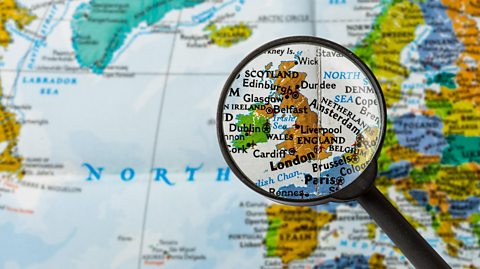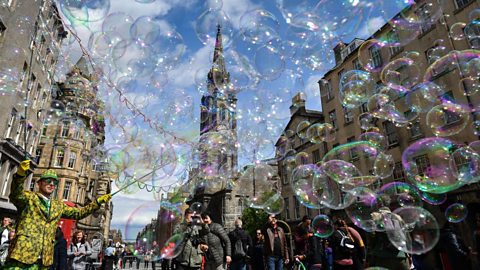Have you ever heard of someone being called a Londoner, a Geordie or a Mancunian? How about an Orcadian, or a Novocastrian, or a Haligonian?
All of these words are demonyms â nouns which describe a person or group of people in relation to the place they are from. But where do demonyms come from?
±«Óătv Bitesize asked Dr Rob Drummond, the Head of the Research Centre for Creative Writing, English Literature and Linguistics at Manchester Metropolitan University, to tell us about the origins and relationships between dialects and regional names.

A brief history of demonyms
Most of us know that a Londoner is someone from London and a Lancastrian is someone from Lancaster. The reason these two are so easy to guess is because the words are created in a very regular or systematic way, by simply adding -er or -ian (albeit with some slight spelling adjustment) at the end of the place name. There are lots of examples like this, such as Sheffielder, Shetlander, East Anglian, and Cardiffian.
Interestingly, the ones that end in -ian can also sometimes be used to describe the local dialect. So a Cumbrian person might also speak in Cumbrian dialect, and Bristolians speak Bristolian.
Then there are the slightly more irregular demonyms such as Mancunian (Manchester) and Geordie (Newcastle). In the case of Manchester, it still uses the -ian ending, but something has happened to the place name.
In this case, you may wonder why it is Mancunian and not Manchesterian. This is because the demonym is actually based on a Latin version of the cityâs name â Mancunium (originally Mamucium), and it has been in use since the 18th Century. Itâs a similar story for Aberdonians, whose demonym is based on the Latin Aberdonia, rather than the more familiar Aberdeen, and has been in use since the 1600s.
But Geordie is different. While we do know that Geordie isnât Latin, no one really knows how the term came about to describe people from Newcastle. But scholars think that it may have something to do with the name George.
In the 18th Century, the Jacobites declared that Newcastle and the neighbouring areas were favoured by King George and were "for George". Then, in the 19th Century there were a lot of people called George living and working in Newcastle, particularly in the coal mines. Using the pet name Geordie then soon became a kind of shorthand for referring first to Newcastle miners, then to men from the area in general, and soon to everybody. These are thought to be the mostly likely explanations for the Geordie title.

When demonyms crossover
But what about about perhaps more unusual ones like Orcadians, Novocastrians and Haligonians? Actually, although not everyone may be familiar with them, all of them are quite easily explained along similar lines as Mancunian and Aberdonian.
Orcadian, despite how it looks, has nothing whatsoever to do with Orcs, the fictional monsters found in The Lord of the Rings, but instead comes from Orcades, which is the Latin name for The Orkney Islands. The name has been around since the early 1600s, so is very well established.
Novocastrian describes a group of people we have already mentioned. You can probably guess which group, especially when you realise that ânovoâ comes from the Latin word for ânewâ. Yes, itâs Newcastle again! Newcastle has two demonyms â a less common, formal one based on the Latin translation of the city name, and a more common informal one based on, well, lots of Georges.
If you take a closer look at Haligonian youâll find itâs referring to people who live in Halifax, West Yorkshire. Not only that, but it also describes those who live in Halifax, Nova Scotia in Canada. Actually, itâs a lot more commonly used to describe the people in Canada, where itâs been around since 1839, than the people in the UK.
But why Haligonia? It turns out that people used to think that the name âHalifaxâ came from the Old English halig feax meaning âholy hairâ, based on a rumour that John the Baptist was buried there. From this itâs easy to get from halig to Haligonian. In fact, the name more likely comes from the Old English halh-gefeaxž but Haligonian seems to have stuck.
With all this variety, itâs actually quite hard to guess the demonym of a place if you donât know it already. And lots of places donât have one. Why donât you find out the demonym of where you come from, and if there isnât one, then invent one!
This article was published in February 2022
Four surprising things you didnât know about accents
±«Óătv Bitesize looks at four interesting factors that can influence the way we speak.

The stories behind some of the UK's street names
Why is it a Royal Mile - and why aren't the Welsh Streets in Wales?

Eight things you use every day but never knew their name
What are the bits on the end of shoelaces called? Or the metal at the top of a pencil?
